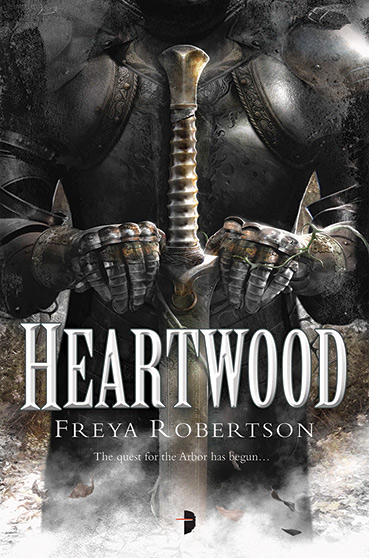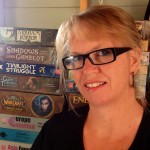Guest Post: “What Lies At the Heart Of Heartwood” By Freya Robertson, Author Of “Heartwood”
Introduction:
Freya Robertson is a fellow speculative fiction author based right here in Aotearoa-New Zealand, and although she has written other books, her first epic fantasy, Heartwood, is “just out” in the USA and UK.
I recently interviewed Freya on SF Signal, and when I also asked her what what she considered to be the major theme or idea behind the book, we decided the best way to answer that question might be for her to do a guest post on the topic.
I am very pleased to welcome Freya here today to do just that.
—
Guest Post: Freya Robertson On “What Lies At the Heart Of Heartwood”
 I’m here to talk about Heartwood, my epic fantasy from Angry Robot Books. In particular, I’d like to share “what lies at the heart of Heartwood?”
I’m here to talk about Heartwood, my epic fantasy from Angry Robot Books. In particular, I’d like to share “what lies at the heart of Heartwood?”
On the surface, the book is about many things. At its most simple, it’s a traditional epic fantasy, about a quasi-medieval society where physical strength is prized above emotional strength, about castles and knights and warfare. It’s about high stakes and long journeys, magnificent battles and saving the world. It does have a fresh twist with its lack of elves, dwarves and orcs and its more modern gender balance. But at its heart, it’s about religion and history, and how over time, the truth can become lost.
I studied history and archaeology at university, and one of the most important things I learned was how it becomes more difficult to interpret documents and artefacts the further back in time you go. It’s easy to put our own bias, ideas and desires into that interpretation, and it becomes harder and harder to find the “truth”. One fictional representation of this is in Star Trek: Voyager, in the 91st episode “Living Witness”. The holographic doctor’s backup program is activated seven hundred years after Voyager’s contact with an alien race. He materialises in a museum where a recreation of events is shown in which all the major details are wrong and the crew are portrayed as sadistic and brutal, because it suits the alien race to push their own political agenda in this way. The doctor is able to help set the record straight by explaining what life was really like at the time.
I used to show this clip when I taught archaeology as I thought it was a great way to summarise the notion that it’s very easy to distort the “truth”, and to show how the interpretation of history changes over time. For example, the Vikings were once portrayed as vicious, bloodthirsty hooligans interested only in raping and pillaging. Over the last few years, scholars have focussed on the fact that they were also farmers and traders, sometimes painting them as relatively peaceful landowners who were just looking for new land. Undoubtedly the truth is somewhere in the middle.
In the opening narration of the movie version of The Lord Of The Rings, Galadriel says, “Much that once was is lost, for none now live who remember it… History became legend, legend became myth.” And this theme is at the heart of Heartwood. The people of the land think of themselves as physical beings. They worship the Arbor, which is the holy tree whose Pectoris or heart was formed from the tears the god Animus cried. They know the Arbor connects them to their god as well as to the land, and they know they should honour the annual Veriditas or greening ceremony every year to ensure the land continues to be fertile. But what they don’t understand is their real relationship to the element of earth, and that because they have forgotten how to maintain the Veriditas properly, the balance has been lost and the element of water is—quite literally—on the rise.
Linked into this theme is the issue of environmental concerns, and the possibility that because we surround ourselves with concrete, we’ve lost our connection to the earth. My personal belief is that there may be elements of religion that have been lost or distorted over time, or where the meaning of something has changed because we, as a people, have changed. The story isn’t meant to push an agenda or be preachy, or to declare I believe there’s a problem with any religion in particular. I just enjoyed exploring the notion of how religion and history can evolve into myth, and how the meaning of things can sometimes change or be lost.
I also explored the notion of how difficult it must have been to be a Templar-style holy knight, celibate and religious and yet also a warrior. The notions that “thou shalt not kill” – unless it’s your enemy – intrigued me, and I enjoyed exploring how the knights, both male and female, balanced these apparently contradictory ideals.
If you’re interested in medieval history, monasticism, religion, nature religions, myth and folklore, hopefully you’ll find something of interest to read about in Heartwood!
—
About Freya Robertson:
 Freya is a lifelong fan of science fiction and fantasy, as well as a dedicated gamer. She has a deep and abiding fascination for the history and archaeology of the middle ages and spent many hours as a teenager writing out notecards detailing the battles of the Wars of the Roses, or moping around museums looking at ancient skeletons, bits of rusted iron and broken pots.
Freya is a lifelong fan of science fiction and fantasy, as well as a dedicated gamer. She has a deep and abiding fascination for the history and archaeology of the middle ages and spent many hours as a teenager writing out notecards detailing the battles of the Wars of the Roses, or moping around museums looking at ancient skeletons, bits of rusted iron and broken pots.
She has published over twenty romance novels under other pseudonyms and won prizes in fifteen short story and poetry competitions. Freya lives in the glorious country of New Zealand Aotearoa, where the countryside was made to inspire fantasy writers and filmmakers, and where they brew the best coffee in the world.
To find out more about Freya, you can find her on her website or her blog, or follow her on Facebook and Twitter.








Much that once was is lost, for none now live who remember it… History became legend, legend became myth.” And this theme is at the heart of Heartwood.
:heart: That’s a great line, that deep evocation of history, myth and time.
I knew I was going to love The Fellowship Of The Ring film when I heard that line!